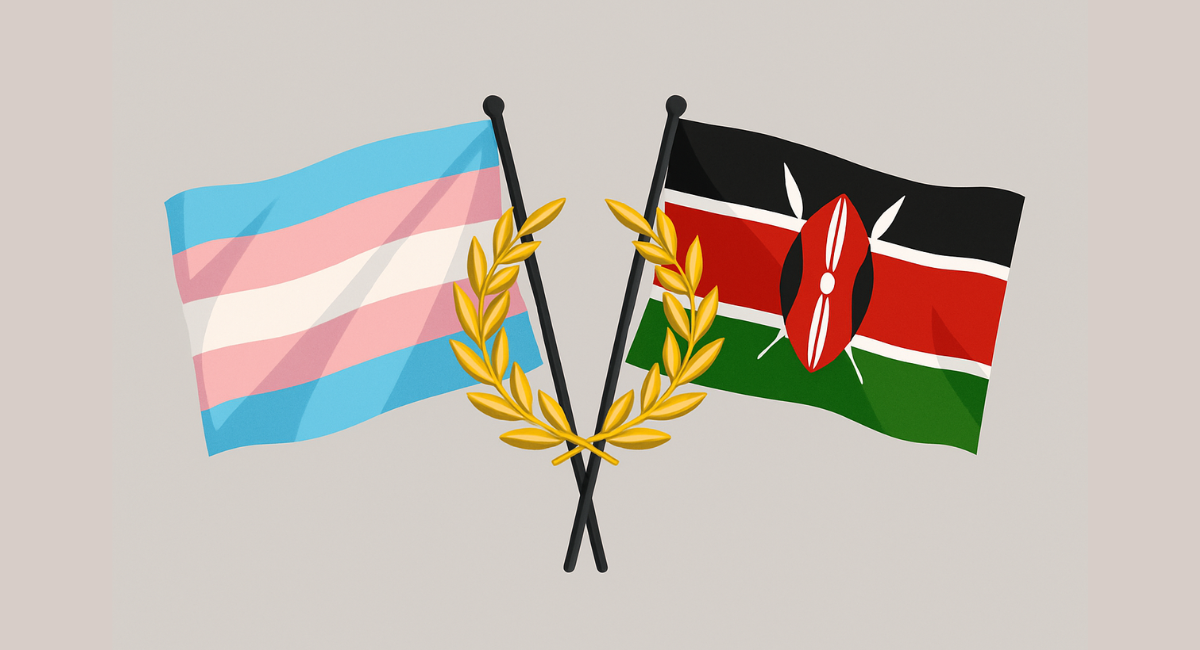The landmark ruling is the first known directive of its kind in Africa, according to Kenyan advocacy group Jinsiangu which supported the trans woman petitioner in court.
by Beza Lealam
A trans woman has won a legal victory in Kenya after a judge ruled in her favour and ordered the government to pass legislation to protect transgender people. Jinsiangu, a local intersex, transgender and gender non-conforming advocacy group, described the judgment as “groundbreaking.”
Known in court by her initials SC, the petitioner was later identified by the Jinsiangu which supported her case. “The High Court in Eldoret has ruled in favour of transgender athlete and Jinsiangu member, Shieys Chepkosgei, awarding her [1 million shillings] in compensation for violation of her rights,” wrote wrote the Nairobi-based group in a Facebook post on Aug 20. One million Kenyan shillings is approximately US $7,600.
The Kenya Human Rights Commission (KHRC) called the ruling “a historic victory.” The Aug. 12 judgment directs the state “to enact a Transgender Protection Rights Act, after ruling that prisons do not provide protections for their dignity and privacy,” according to the NGO’s statement. Alternatively, the judge said the government could amend Kenya’s 2024 Intersex Persons Bill to fill the necessary gaps in the law.
“We welcome the court’s decision, which further held that state-imposed limitations on SC’s core rights, including freedom from torture and cruel, inhuman or degrading treatment, equality and non-discrimination, dignity, freedom and security of the person, and privacy were unconstitutional,” stated KHRC.
Chepkosgei, who was born male but identified and lived as a female from childhood, had obtained official documents with a female sex marker, including an ID card, birth certificate and passport. Arrested in a hospital in 2019 for “impersonation,” she underwent a strip-search genital examination in prison and then hormone testing and blood sampling without her consent. Her private medical records were also leaked to the media.
At the time, Kenyan newspapers ran numerous reports misgendering and deadnaming Chepkosgei.
“The court’s decision to recognise SC as a transgender person further upholds the right of transgender persons to determine their self-identified gender. The state is directed to grant legal recognition of that gender identity within Kenya’s legal framework. This is a decisive step that moves recognition from debate to duty,” said KHRC in a statement co-signed by advocacy groups Galck, the Amka Africa Justice Initiative, the Initiative For Equality & Non-Discrimination, National Gay & Lesbian Human Rights Commission and Pema Kenya.
The groups called on the attorney general’s office to pursue the immediate work necessary following such a judgment and parliament “to take up the legislative opportunity identified by the court so that equality is a principle and a lived reality for every transgender Kenyan.”
The ruling builds on previous landmark cases that collectively demonstrate a growing judicial acknowledgement of transgender rights in Kenya’s constitutional framework.
Lolyne Ongeri, Jinsiangu’s communications lead, recalled the 2014 case of Audrey Mbugua Ithibu, in which “the court recognised a transgender woman’s right to have her academic certificates reflect her gender identity.”
Ongeri went on to explain the potential implications of the latest Chepkosgei case. “If implemented, it could address decades of legal invisibility and discrimination faced by transgender persons by establishing clear legal recognition of gender identity, protections against discrimination in employment, housing, healthcare, and education, and access to public services without bias or harassment.”
“This victory is a powerful reminder that, as a movement, we thrive when we work together toward our common goals,” concluded Ongeri, noting the early contribution of the Transgender Education and Advocacy (TEA) in the petition. “Going forward, Jinsiangu will closely monitor the state’s next steps.”
The broader fight for LGBTQ+ rights is ongoing in Kenya where LGBTQ+ people are regularly subjected to discrimination, persecution and violence. Same-sex sexual activity between men is criminalised in the country, punishable by a penalty of up to fourteen years’ imprisonment, according to UK-based NGO Human Dignity Trust.
Even so, the latest case represents a step forward — an encouraging sign in a country often regarded as among the least hostile in East Africa, and where LGBTQ+ advocacy groups can at least operate openly.

